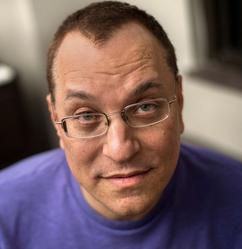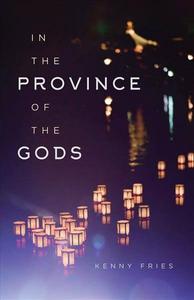
|
|
| photo: Michael R. Dekker | |
Kenny Fries is the author of Body, Remember: A Memoir and The History of My Shoes and the Evolution of Darwin's Theory, which received the Outstanding Book Award from the Gustavus Myers Center for the Study of Bigotry and Human Rights. He edited Staring Back: The Disability Experience from the Inside Out and was commissioned by the Houston Grand Opera to write the libretto for The Memory Stone. His books of poems include Anesthesia, Desert Walking and In the Gardens of Japan. In the Province of the Gods (University of Wisconsin Press, September 19, 2017) is the recipient of the Creative Capital innovative literature grant.
On your nightstand now:
There's no room on my nightstand for books. But on the floor by my bed is The Rest Is Noise by Alex Ross because that's what I'm reading. There are other books there, but that doesn't necessarily mean these will be the next books I read. When I'm between books, it is an anxious time of choosing because once I start a book I need to finish it no matter what I think of it. It's a commitment I don't take lightly.
Favorite book when you were a child:
Are You My Mother? I sometimes still dream about this book and when I wake up I wonder if the book actually exists.
Your top five authors:
Difficult because it changes. Adrienne Rich. Yasunari Kawabata. Tennessee Williams. Henry James. W.G. Sebald (a more recent addition).
Book you've faked reading:
This took me a while because I don't fake much. But I never finished reading James Joyce's Ulysses, and it was difficult to understand what everyone was talking about in the Modernism class I took when studying in London.  Book you're an evangelist for:
Book you're an evangelist for:
Geek Love by Katherine Dunn. This book turns everything about disability upside down, and then some. It is funny, poignant and says things about the disability experience that is shocking to some. What shocks me is that it was written by a nondisabled writer.
Book you've bought for the cover:
Hmmm. Did I ever buy a book for the cover? I'm sure there was a book cover with a picture of a guy I was attracted to on its cover, but I can't remember buying such a book.
Book you hid from your parents:
I know I hid things from my parents but I can't remember hiding a book from them. I'm not one to hide things, as you can tell if you read my books.
Book that changed your life:
Adrienne Rich's Diving into the Wreck. When I first read these poems as an undergraduate, I somehow felt what she was after in her poems was what I was after in my life. Decades later, I still feel this way. I was fortunate to correspond with her and to meet her, which I wrote about in an article for for the Progressive after she died.
Favorite line from a book:
Another difficult one. For some reason I keep thinking of first lines as my favorites. So, I'll go with both "The sun and the moon are eternal travelers," from Bashō's Narrow Road to the Interior, and "I had a farm in Africa, at the foot of the Ngong Hills," from Isak Dinesen's Out of Africa. These beginnings hold within them so much in so few words.
Five books you'll never part with:
My signed copy of Adrienne Rich's Diving into the Wreck (though I couldn't find it for a long time, but finally did when I was moving); the illustrated edition of Edmund de Waal's The Hare with Amber Eyes; a first edition of Alfred Russel Wallace's The Malay Archipelago (given to me at the graduation of one of my students by her grandmother who knew I was writing a book about Darwin and Wallace); my extremely beat-up paperback of Chekhov's plays (though I now have another copy of the same edition); my signed copy of Hilda Morley's What Are Winds and What Are Waters (meeting Hilda was definitely a life highlight).
Book you most want to read again for the first time:
Kawabata's Thousand Cranes. This was my introduction to Kawabata, after which I read everything of his that has been translated into English. My understanding of things Japanese owes a lot to reading Kawabata.
Writers you would invite to a dinner party:
Here, I'm going to keep to writers no longer alive: Isak Dinesen, Susan Sontag, Franz Kafka, James Baldwin and Sei Shōnagon. Though each was privileged in some way, each also was an outsider who looked at the world with an appraising, critical eye. That would be quite an interesting evening!

